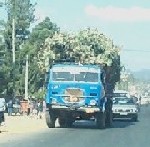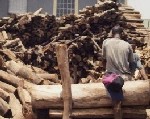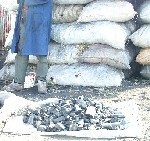Many African countries rely heavily on biomass fuels.��Although
most people prefer modern commercial energy sources (e.g. kerosene, gas
& electricity), traditional fuels such as charcoal, firewood and dung
are often their only option.� �
In the three countries that are the focus of this project - Kenya,
Ethiopia and Uganda
- the supply and distribution of firewood and charcoal is undertaken by
a range of actors, from charcoal producers, to transporters and distributors,
to market vendors and door-to-door sellers of fuel.
The negative
aspects associated with the use of traditional fuels include:
| � | health impacts of indoor pollution, e.g. conjunctivitis, respiratory illness |
| � | environmental degradation |
| � | injuries & hazards from collecting & carrying heavy loads of fuelwood |
These three
countries have seen policies to discourage the use of traditional fuels,
and are promoting the use of modern fuels such as kerosene, LPG and electricity.��Improved
stove programmes have also been implemented with varying levels of success
- visit ESD's Poverty
Stoves web site.
|
What
is 'Fuel Substitution'? Fuel switching: termination of the use of one type of fuel and uptake of another source of energy in its place. Inter-fuel substitution: introduction of new energy sources that do not replace, but supplement, existing fuel types. Even when new sources of fuel are introduced, traditional fuels continue to be important.�This is particularly true for those countries where cooking food is not just a daily chore but can also bear elements of cultural identity (e.g. the coffee ceremony in Ethiopia which requires charcoal, and steaming matooke in Uganda which needs woodfuelled fire for many hours). |
Links to related websites
| The Shell Foundation | |
| Livelihoods Connect | |
| ITDG Intermediate Technology Development Group and ITDG Publishing | |
| HEDON Household Energy Network Organisation | |
| DFID Department for International Development | |
| id21 Development Research | |
| Improved Household Stoves and Poverty Reduction | |
| International Network on Gender and Sustainable Energy | |
| Sparknet - knowledge network focusing on energy for low-income households in Southern and East Africa |
For more information on this project, contact Ottavia Mazzoni / Hannah Isaac
 �
�
Transportation - motorised and non-motorised
 �
� �
�Sales of wood and charcoal
In order to assess the extent of the livelihood impacts, this project is using a range of research tools, from tallies and questionnaires right down to individual case studies, that will be analysed using a Sustainable Livelihoods framework. This framework, developed by DFID, enables a much wider range of poverty and livelihood indicators to be taken into account than those used in traditional poverty analysis.
| �Gender and fuel supply | |
|
|
|





